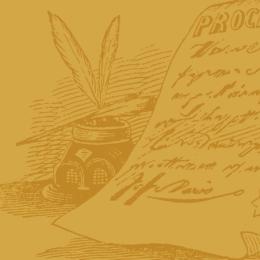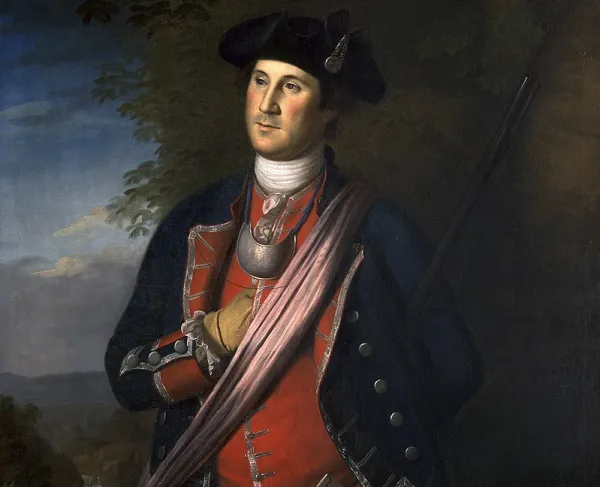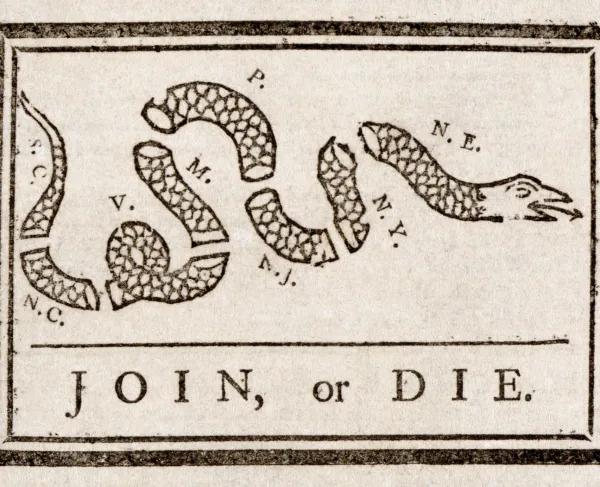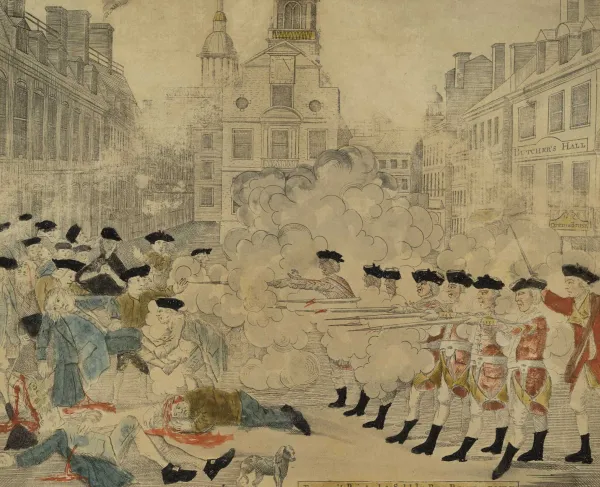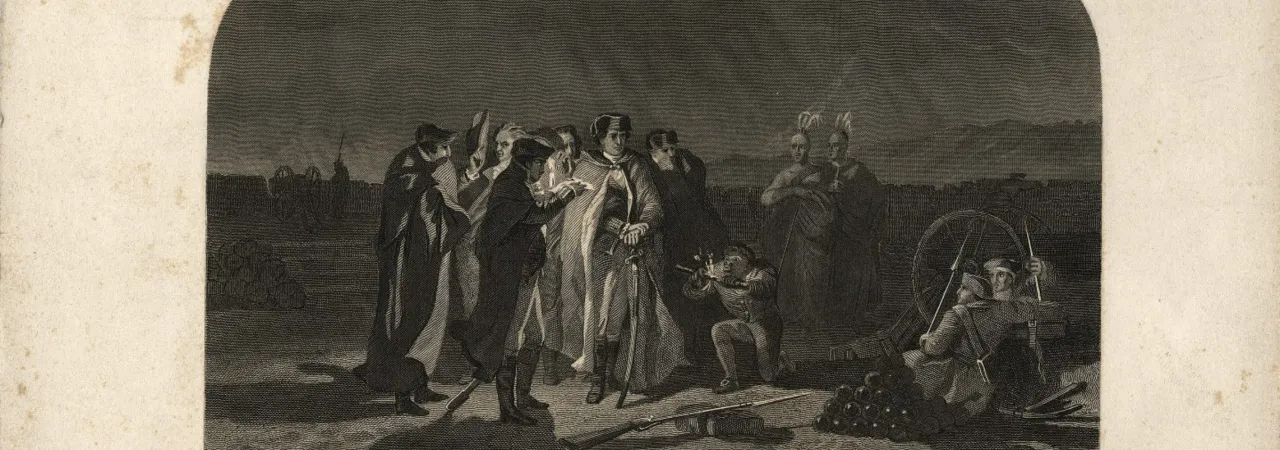
In 1754, the British and French empires in North America were both competing for control of the Ohio country. This region, between the Ohio River and the Great Lakes and covering modern-day Ohio as well as parts of Pennsylvania and Indiana, was strategically important to both empires. This imperial contest provided an opening for George Washington’s first military experience – one that would alter the course of world history.
At 21 years old, George Washington was an ambitious major in the Virginia militia. He volunteered to carry a message from Virginia’s lieutenant governor, Robert Dinwiddie (the governor was a British earl who never once traveled to the colony) to the commander of French forces that had begun to build forts in the Ohio country – lands that, according to Dinwiddie, were “so notoriously known to be the property of the Crown of Great Britain.” The French rejected this claim and refused to vacate, so the lieutenant governor began to prepare for more forceful action.
Dinwiddie ordered a fort constructed at the Forks of the Ohio, the place where the Monongahela and Allegheny Rivers come together to form the Ohio River. George Washington received a promotion to lieutenant colonel, and instructions to raise a force of soldiers to garrison the new fort. These soldiers would be part of a new unit called the Virginia Regiment – Washington would command the advance force, and the rest of the unit would follow behind under his superior, Colonel Joshua Fry. Washington’s orders from Dinwiddie were, “to act on the Defensive, but in Case any Attempts are made to obstruct the Works or interrupt our Settlements by any Persons whatsoever, You are to restrain all such Offenders, & in Case of resistance to make Prisoners of or kill & destroy them.”
That mission was complicated when Washington learned that the French had seized the half-built fort at the Forks of the Ohio. This threatened the interests of the British, and their Native allies. A Seneca leader named Tanacharison, who had been appointed by the powerful Iroquois Confederacy to speak on behalf of the Mingo, Shawnee and Delaware who lived in the Ohio country, saw the expansion of French influence in the region as a danger to Iroquois control. At Tanacharison’s urging, Washington pressed on into the Ohio country. His plan was to find a suitable place to wait for the rest of the Virginia Regiment to reinforce him, then retake the Forks. By May 24, his men had reached a place called the Great Meadows (near modern Farmington, Pennsylvania). This natural clearing contained a source of fresh water and grass for the unit’s animals. On the evening of May 27, a Native messenger arrived with information from Tanacharison: a party of French soldiers was camped nearby, only a few miles from the Great Meadows.
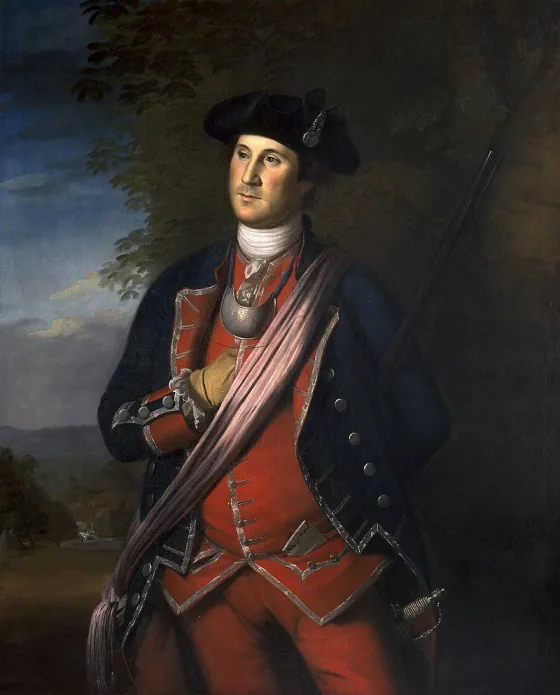
Washington took forty men and set off to meet with the Half King, marching through a rainy night. By the morning of May 28, the Virginians and Tanacharison’s Native warriors had reached the French camp in a glen. Washington deployed his Virginia Regiment troops on the high ground overlooking the camp, while Tanacharison and his warriors moved to block the exit.
What happened next is not known for certain. An account from a French survivor claimed that the Virginians opened fire without warning or provocation. Washington’s report claimed that one of the Frenchmen saw the Virginians above the camp, and fired a shot from his musket. Either way, Washington’s men fired two volleys into the French camp. Some French soldiers managed to return fire, because Washington would later write, “I heard the bullets whistle, and, believe me there is something charming in the sound.” The engagement lasted around 15 minutes. The French surrendered when they saw that Tanacharison his warriors had cut off their only escape route. Washington reported that one of his men had been killed and three were wounded, while fourteen Frenchmen had been killed or wounded in the exchange. Among the wounded was the French commander, Ensign Joseph Coulon de Villiers de Jumonville.
Ensign Jumonville declared that he was serving as an ambassador, bringing a diplomatic message to Washington, asking him to withdraw from territory claimed by France. Washington disputed this, since the French had concealed themselves rather than openly approaching his nearby camp. Suddenly, Tanacharison made a shocking move. He stepped up to Jumonville and said, in French, “Thou art not yet dead, my father.” Then he killed the ensign with his tomahawk. Tanacharison, by referring to Jumonville as “father,” was making him representative of French power and their growing relationship with the Native peoples of the Ohio country. By killing the French officer, he was symbolically destroying that power. His warriors then killed and scalped all but one of the French wounded.
A shaken Washington took the 21 remaining prisoners back to the Great Meadows camp. He wrote a report to Dinwiddie, downplaying the events at the glen and claiming the French were spies. He sent the prisoners back to Virginia, with a warning to disregard whatever they might say about what had happened. Then he began to prepare for the French retaliation. He fortified his camp, building a wooden stockade around a small storehouse and having his men dig entrenchments around it. Washington boasted in a letter that, “I shall not fear the attack of 500 Men.” He described the Great Meadows as “a charming field for an encounter.” He would learn whether these declarations were true in a little over the month, at the Battle of Fort Necessity.
The glen where the skirmish took place is now known as Jumonville Glen, for the slain French ensign. He did not know it yet, but Washington had just fought the first action of what would become the globe-spanning Seven Years War. The short skirmish is best summed up by a quote attributed to the British writer Horace Walpole: "The volley fired by a young Virginian in the backwoods of America set the world on fire."
